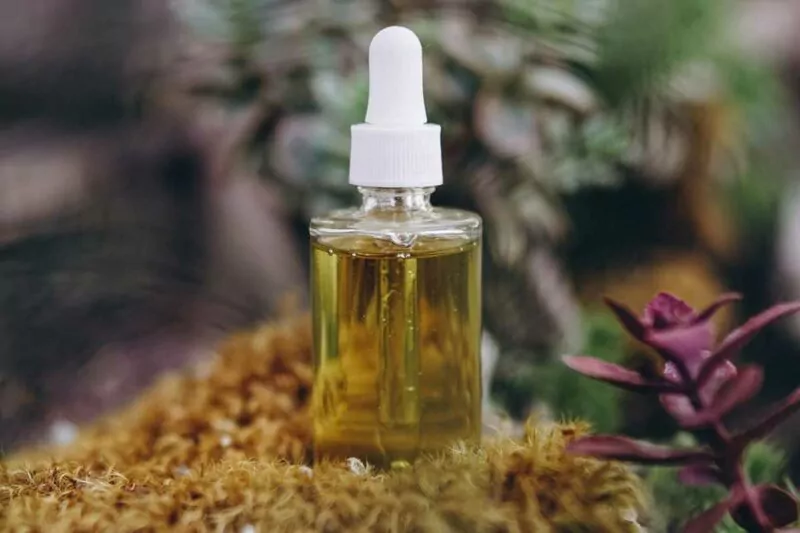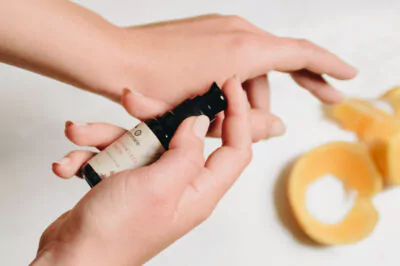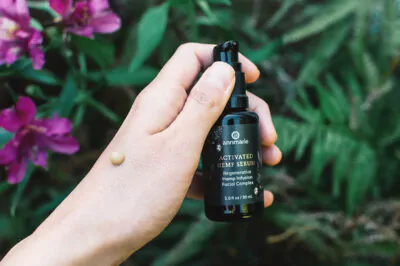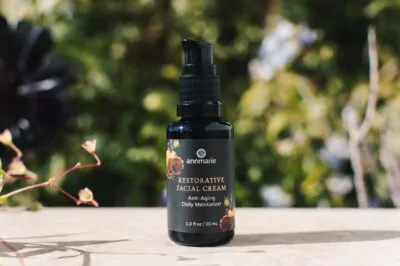Table of Contents[Hide][Show]
If you look around your bathroom, chances are high that you’ll come across at least one product with vitamin C listed in the ingredient list. It’s a popular ingredient in skin care that continues to be loved by many for its wonderful benefits for the skin. There are so many different forms of vitamin C. You can find it in body washes, face washes and even some shampoos. More commonly, vitamin C is found in serums, toners and moisturizers, though vitamin C powders are growing in popularity. In this article, we’ll focus on serums.
What Do Vitamin C Serums Do?
Serums are aqueous-based solutions that hydrate the skin, often teeming with activated ingredients that target specific skin concerns, and are applied before your moisturizer. Vitamin C serums are most commonly utilized for their ability to brighten, protect, and support aging skin.
Due to their aqueous base, serums tend to absorb faster versus moisturizers, which are oil, cream or balm-based products. For this reason, vitamin C serums (like our Wild Fruit Serum) sit wonderfully under both your moisturizer and sunscreen to provide amazing nutrients and extra protection against environmental stressors.
Vitamin C Serum for Skin Care: Multiple Benefits

Most ingredient hype is a flash in the pan in the beauty industry, but not when it comes to vitamin C. We want to demystify why a vitamin C serum for skin care is such an incredibly popular and long standing staple for so many people. For decades, companies have created or incorporated vitamin C into their products because it’s so effective in working on the uppermost layers of the dermis to enhance the skin’s appearance. What are the benefits of using a vitamin C serum? It helps brighten uneven color and give an overall firmer look and feel to the skin.
- Helps reduce temporary redness
- Helps fade the look of discoloration
- Targets the appearance of dark spots for a restored glow
- Evens out skin tone
- Brightens dull, lackluster skin
- Protects skin against environmental stressors
- Firms and tightens skin
- Plumps skin for a bouncy-looking complexion
What to Look for in a Vitamin C Serum?
If using L-ascorbic Acid, look for appropriate packaging
Without a doubt, the most studied and most commonly known and used out of all the vitamin C forms is l-ascorbic acid. While it does the job at brightening and enhancing your natural complexion, l-ascorbic acid is also highly unstable and extremely hard to package in a way that allows it to remain potent. One of the most important things to look for in a vitamin C serum is appropriate packaging. An opaque, dark glass bottle (like amber or violet miron glass) is ideal because sunlight degrades l-ascorbic acid quickly and you want to limit the chances of oxidization, as this temperamental ingredient can result in staining skin if it oxidizes on the skin upon application. The most ideal packaging is an air-tight pump to mitigate contact with oxygen, because oxygen oxidizes the formula faster, making it less effective.
Pro Tip: A quick way to know if your vitamin C serum has oxidized is if it’s taken on a deeper orange/brown hue.
Or, Look for a Product That Uses Gentler Forms of Vitamin C
A wonderful thing about the skin care industry is the fact that it’s ever evolving. This includes developing new ingredients and improving upon older formulas. There are a handful of vitamin C derivatives that, while have been less studied compared to l-ascorbic acid, are also less irritating to the skin.
Sodium Ascorbate
Let’s have a science lesson real quick. Sodium ascorbate is the sodium salt of ascorbic acid. When applied to the skin, sodium ascorbate turns into ascorbic acid. This means that while sodium ascorbate is not as potent as l-ascorbic acid, over time it’s still incredibly effective and buffered (so less likely to cause irritation to those with more sensitized skin types.) We chose to include sodium ascorbate, paired with the kakadu plum as our form of vitamin C in our gorgeous Wild Fruit Serum – Brightening Facial Complex.
Tetrahexyldecyl-ascorbate
Tetrahexyldecyl-ascorbate (or THDA for short) is highly stable and is formulated to sink straight into the skin to work its magic. This is one of the more moisturizing vitamin C forms, as it is oil-soluble, and is great for dry and more mature skin types. Though a derivative form, THDA is still incredibly effective and that’s one of the reasons we chose it as a main ingredient in our Brighten product in the Concentrated Boosting Elixirs. Just add 1-3 drops of this boosting elixir to your existing serum or facial oil.
Find a formula made entirely with clean ingredients that is void of harsh, toxic chemicals
Alongside the importance of finding the form of vitamin C that works best for your skin type, we also recommend that you carefully read the full ingredient list of your vitamin C product to ensure the entire formula is truly clean and of utmost quality. When you are using a product with actives (in this case, vitamin C) for its major benefits to the skin, you won’t want to counteract such effects with other ingredients that could potentially harm or degrade your skin in the long run. We are big on non-toxic serums & elixirs, made with organic and wildcrafted ingredients, so that your skin thrives in both its beauty and health.
Who Should Use Vitamin C Serums?
Vitamin C serums—especially the serums or elixirs that use non-irritating forms of vitamin C—can be used by all skin types. For our sensitive skin friends, we would encourage you to explore products that incorporate the gentler vitamin C derivatives, like oil-soluble THDA, and to always patch test any new product before applying fully. Plus, check out our latest post on how to use your vitamin C serum effectively for best results.
Side Effects of Vitamin C Serums
As with any skin care active, there is risk for irritation. The side effects of a vitamin C serum may include dryness or flaking, redness from a compromised skin barrier and extra sensitivity from pre-existing skin conditions. These signs are often associated with the usage of L-ascorbic acid, which is most effective at a lower pH and therefore more likely to adversely react with more sensitive skin types because of its higher acidity.

The Right Vitamin C Serum for You
Ultimately, the best serum, vitamin C or otherwise, is the one that works for your skin type and lifestyle. It’s important to research and find an efficacious product that gives you your desired results, while knowing that what you’re putting on your skin is high-quality. We here at Annmarie Skin Care pride ourselves in sourcing traceable, organically-grown ingredients that work with your skin to help you achieve the results you’re looking for. If you’re looking for a vitamin C product—made with nourishing and effective ingredients—to illuminate your skin and restore your glow, head on over to our serum & elixirs collections!
Frequently Ask Questions
Does a Vitamin C Serum Lighten Skin?
Vitamin C can help enhance the appearance of your natural complexion, minimize the appearance of dark spots, help fade away discoloration for a more even skin tone, and add an illuminating glow. It does not lighten your overall skin shade.
Can a Vitamin C Serum Reduce Acne?
While many people have found a vitamin C serum to be a useful step in their skin care routine for brightening their complexion and improving overall texture, acne is a medical condition and should be treated by consulting with your doctor, health-care practitioner, or a medical professional.








Leave a Reply